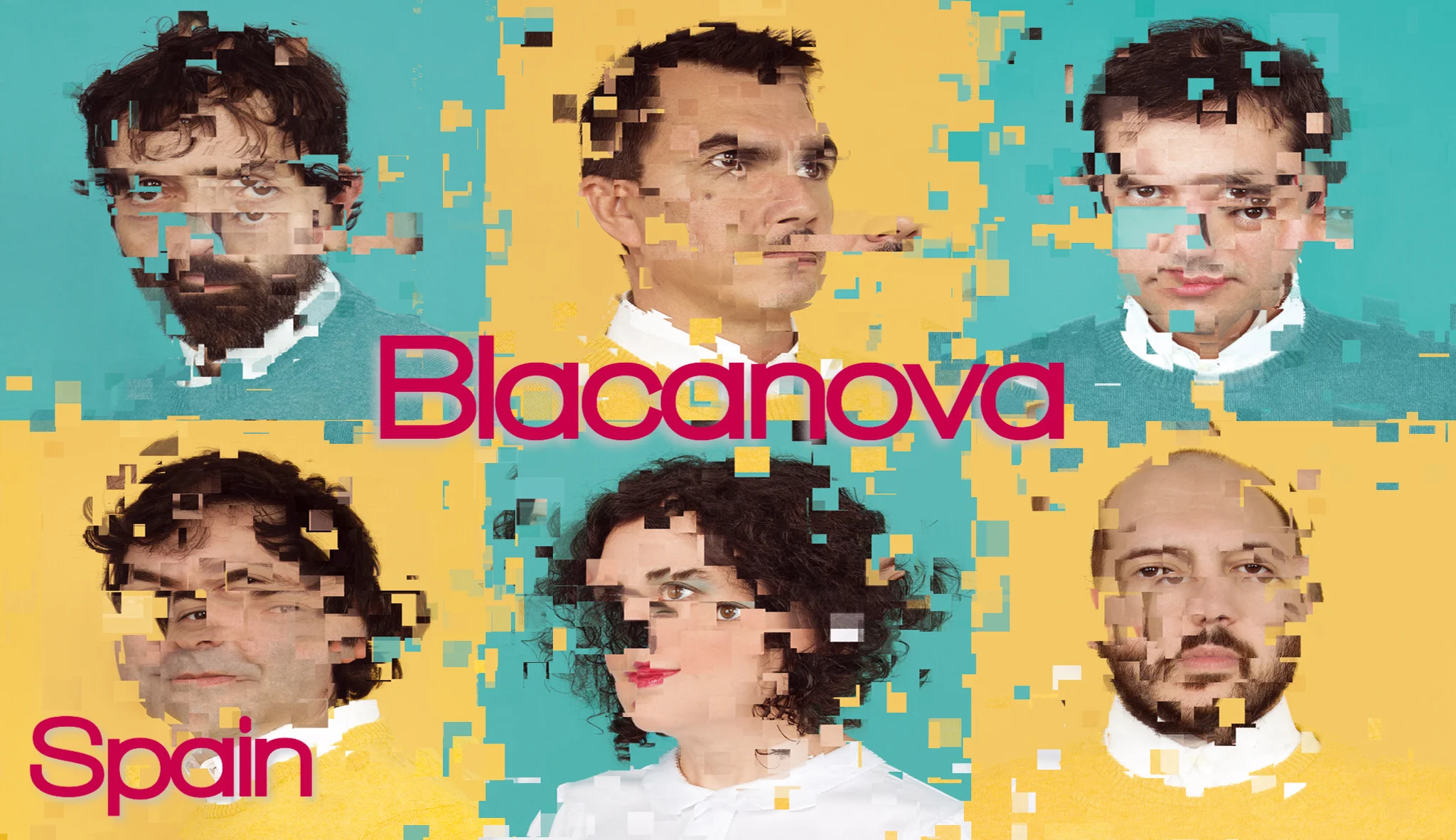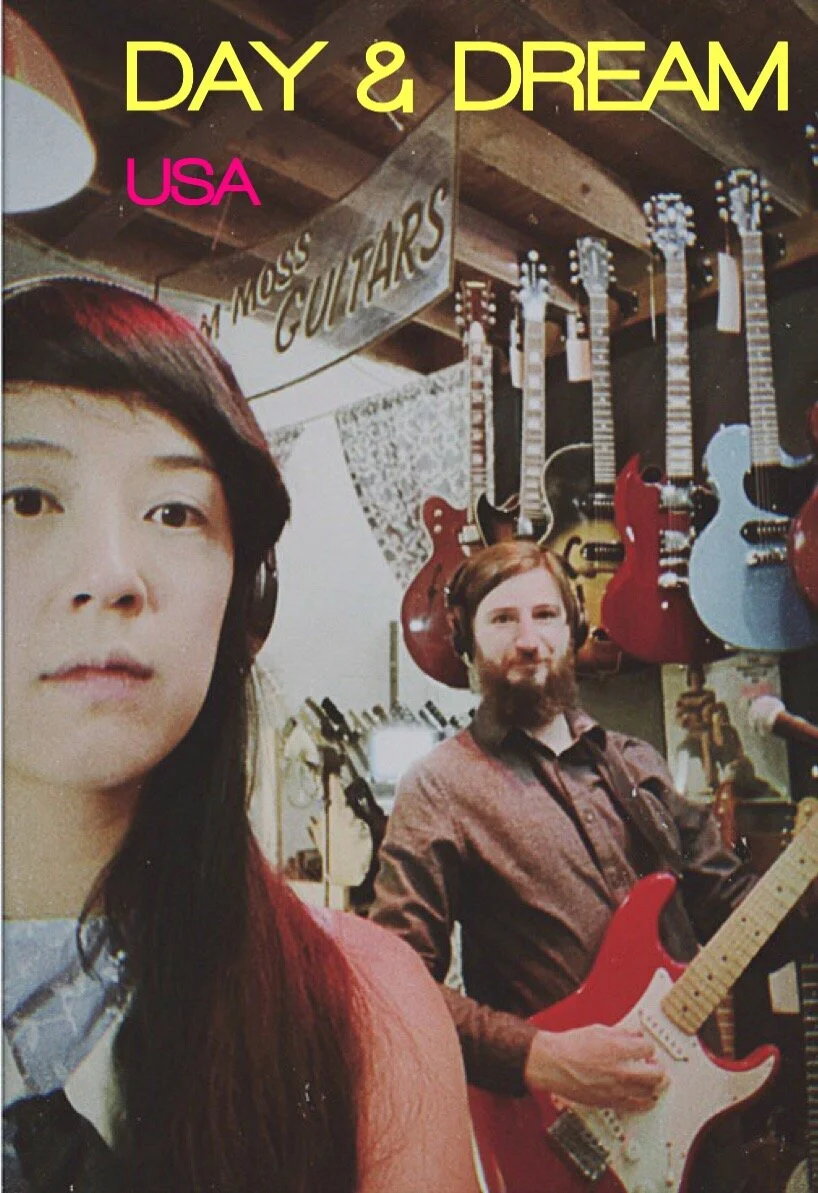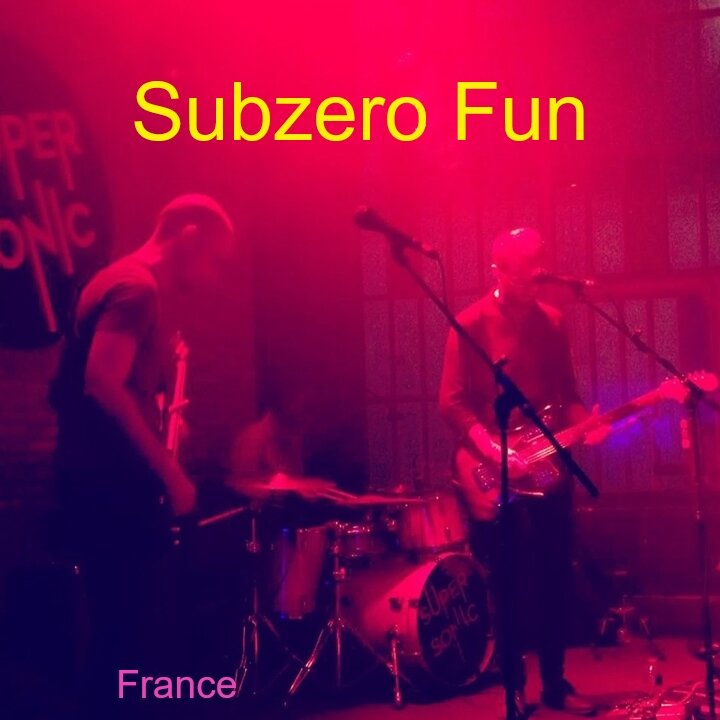BLACANOVA (Spain): Warm and sunny dreamgaze from Seville
Blacanova are from Seville, Spain, and were created in 2006. Their music incorporates a wide range of genres, such as Shoegaze, Noise Pop, Dream Pop, Post Punk, Psychedelia or Post-Rock.
Their music is sometimes similar to Slowdive’s with a hint of My Bloody Valentine, but without the coldness or remoteness that you can find in the incumbents’ music. It is like listening to a warm Dreamgaze fire, sitting with old friends, a nice whisky (or cup of tea) in hand, comfortable. There is very little anguish or anxiety. I find their music leaves you at peace. It does not create more stress in your life, rather the contrary.
In this, Blacanova is a quite rare band, in genres where the music is more often than not a bit disturbing in its soundscape or arrangements. There is always warmth to be found in their music, maybe coming from mixing the soft female and male voices, always present in the forefront.
The only slightly grim part of their work are the LP and Ep’s covers. You can have a look on Bandcamp. you will see it is closer to Hans Ruedi Giger than to Eugène Gauguin.
I also love the way the use Spanish in their song and blends it so well with the music.
This, and their beautiful and talented music work, are the reason why I love Blacanova, possibly one of the more underrated Dreamgaze bands around.
Some history
In 2010, the band publishes its first LP with the label Foehn Records, titled homonymously Blacanova. Qualified as one of the most original and interesting proposals in the national independent scene by diverse prestigious written and digital publications (Rockdelux, Go Mag, Mondo Sonoro, La Vanguardia, Hypersonic, Playground, etc.), the LP is considered one of the best albums of the year in numerous lists of different media.
After several advance digital singles, Blacanova presents at the end of 2012 his second LP, "How do you see the world a horse? ", edited by the Barcelona label El Genio Equivocado. With his second LP, he also receives excellent reviews and appears in numerous specialized lists, the sound of Blacanova is consolidated from two basic elements: some letters that play with the desolate, macabre and at the same time hilarious deformation of the everyday and a musical discourse based on vocal games, layers of reverb, distortion and rhythmic patterns that they oscillate between slow and melodic developments and outbursts of powerful intensity.
In the spring of 2015, the band released their third LP, "Devastated Regions." In this new installment, Blacanova repeats edition with ‘El Genio Equvocado’ and recording in the La Mina studios, by Raúl Pérez (McEnroe, Pony Bravo, Pumuky, etc.). The mastering is done by Doug Van Sloun in Focus Mastering (Omaha). The new LP is a step forward in the trajectory of the band and a different album in many aspects, betting on new and surprising arrangements (synthesizers, wind instruments and string) that share protagonism with the already characteristic guitars in compositions that are enriched with denser textures and worked. Dynamics and contrast are the basis of a disc where the game is important and not allowed borders when it comes to experimenting with sounds, structures and voices.
The band has also released songs with other international labels, such as Series Two Records (USA), Slanty Shanty (USA) or TBTCI Records (Brazil) and has appeared in compilations edited by media such as RockdeLux, Go Mag, etc.
Blacanova currently consists of:
Manuel Begines (bass guitar, keyboards),
Inés Olalla (vocals, keyboard)
Eduardo Escobar (drums),
Cristian Bohórquez (guitar, keyboards, programming),
Paco Arenas (guitar, keyboards, programming),
Armando Jiménez (vocals, melodica, xylophone).
When asked what their music is about, the band tells us:
Blacanova incorporates a wide range of genres, including shoegaze, noise pop, dream pop, post-punk, psychedelia and post-rock. Dark, dense, hypnotic are adjectives used sometimes to describe our work by the musical press.
Our musical discourse is based on vocal duets, multiple reverb layers, lots of feedback, distortion and intensity outbreaks. We really enjoy including new arrangements in our recordings (synthesizers, strings, winds, etc.) which share the spotlight with guitars and create both dense atmospheres and luminous textures.
We always tried dynamics and contrast were essential in our albums with no boundaries to experiment with sounds, structures and voices.
THEIR MUSICAL WORK
You can find Blacanova’s musical work on Bandcamp. To date, it consists of:
Infidelidades Múltiples en "Úrsula, 10 años por amigos", song, 2002
Monja, EP, June 2007
Perro, EP, June 2008
Madre, EP, March, 2009
Blacanova, LP, May 2010
Checoslovaquia, Single, April 2012
¿Cómo ve el mundo un caballo?, LP, September 2012
El Abrigo, single, July 2013
La Soga, single, February 2015
Regiones Devastadas, LP, March 2015
El Abismo, single, December 2017
Zoe, single, November 22, 2017
La Cabeza, LP, January 2018
The music work is so vast that it is difficult to present all the LP and EPs individually.
One thing is for sure: when you listen to their work in order, you can hear how it matures over the year. Like a good wine. It does not change recipe or style, but improve their song-writing and arrangements knowledge, getting slowly at ease of who they are and what their music is.
To continue the wine allegory, their music is a very nice young wine at the beginning, turning slowly in a “grand cru” as the years progress.
Here are a few songs (one song by EP or LP in chronological order) to discover their music. for more, all their work is on Bancamp.
THE INTERVIEW
The Band
Where are you from? Where are you living now?
Inés, Edu, Paco, Villa and Armando are from Seville (Spain); Cristian is from Ceuta. We are all living in Seville or very close to this city.
What did you study?
It's a kind of bizarre mix, which includes grades like Psychology, Journalism, Engineering and even the horrible Business Administration.
What is your day job at present if any?
Another bizarre mix. Sometimes interesting, sometimes boring.
Do you dream to live from your music or is it a passion you do not want to spend your full time on?
It's really complicated to live from our music. You know, I am afraid this is far from ‘mass media music’, at least not in Spain.
You have a great history. Could you tell us more?
When we started, we never thought that we could release four LPs and a number of EPs and singles. Our released music reflects our history, we think, specially our evolution and feelings through the years.
Could you tell me how the band meet and decided to do music together?
It started as a kind of goth/ dark wave joke between friends at the very beginning. Nevertheless, Monja (2007), our first EP, mixed all our shoegaze, dream pop and post-punk influences for the first time. Perhaps we got our own style with the first LP (Blacanova, 2010).
Can you tell me the inspiration behind your band? You can detect the influences of shoegaze and have a very unique sound. You took all these influences to make your own music, your own sound, which is not easy. Could you tell more?
A number of shoegaze, dream pop, post-punk and even post rock bands are an important influence in our music. However, we think we got our own sound working on some pedal effects, keyboard and guitar textures, irregular melodic structures and vocal arrangements. Bass and drums were always clear and forceful. Furthermore, lyrics are important in our songs.
Was there a vision of sorts or did you know what you wanted to do when you started up
We were Shoegaze and post-punk music fans, so we knew what we wanted when we started up. However, we always tried not to do just ‘genre music’, but looked for an own identity.
Do you have any other musical side projects apart from this band?
Yes, we do. In fact, we are now focused on these projects. We are very proud of ‘La Cabeza’ (2018), Blacanova’s last LP, and we really enjoyed working on these songs. However, after the release of this album on January, Blacanova went on a hiatus and we are working on our side projects. Cristian, Inés and Paco are members of Martes Niebla and released their debut EP last April. They are going to record their first LP over 2019. Cristian is also making music with Escuelas Pías (they released their second LP on November). Villa, Edu and Paco are recording their new songs as Beladrone these days and they hope to release their first album this year too. Finally, Edu is also playing with Ultra Lutra. So, we really don’t stop making music at all.
Could you tell me more on the band composition?
Regardless of the demo’s origin, we always worked together with our songs.
Can you tell us more how you came to have the band’s name?
The band was named after Olga Baclanova, the leading actress in Freaks (Tod Browning, 1932), though her surname was changed slightly for phonetic reasons.
The Creative process
Who writes the song and the music and how do you get to the final song? Is it a community process, do you have leaders in composing or arranging music?
It has always been a collaborative process. We never believed in composing / spiritual leaders for Blacanova. It always sounded quite ridiculous between us ;)
Do you listen to the advice of your band mates? What would you do if they said a song was shit but you liked it?
We have always tried to work with the songs in order to get the band’s general approval. And most of the times we got this, probably because we have a shared idea of the Blacanova’s own sound.
There’s a degree of unconventional songwriting with you guys. Was it kind of intimidating going to record knowing people might not be engaging with the songs in terms of hooks and such and trying to deliver an engaging sound on record?
We have tried to be honest with our likes and dislikes. There is no sense in making music you don't believe in, even if some (or a lot of) people are not easily engaged with your songs. However, we never thought our songs were complicated or not easy to hear and enjoy. Perhaps it's just a question of time and relax. We always recommend not to do many things while you listen to our music. Just listen to it and enjoy it when you are not in a hurry.
Talking about the lyrics: who write them? Is there a common thread in them, a theme?
Most lyrics are written by our two singers: Inés and Armando.
Do you have a message that you want to get across in your music? If so, what are some of the messages you want to spread?
Our lyrics tend to be quite disconcerting and play with the distressing and hilarious distortion of everyday reality. There are many literary and cinematographic references in them too.
Did your listening habits changed over the years and does it affect what you write?
Probably they did. We have always tried to be aware of new bands and new sounds.
How is your recognition going worldwide? Is it growing? Are you happy with it?
We think our music has been well respected by Spanish music critics. Of course we are very far from being a massive band. Even some people say we are a kind of cult band or something weird in Spanish music.
We had the chance of recording and playing all these songs over more than 10 years. We also had people supporting us from different countries. So, it has been very nice and great for us. For a band like us it was really amazing to send some vinyl records from Seville to Shoegaze fans in countries as Indonesia, Chile, Poland, USA or France.
The path to music
Is it easy to find producers and studios where you lived for indie-rock? Your recorded sound is very good, which is not easy. Did you engineer the sound yourself, or did you have a sound engineer with you? If yes could you tell us more about him/her?
It is not easy to find top studios here, but we were very lucky with Raúl Pérez and his studio ('La Mina’). He is one of the best indie producers and sound engineers in Spain and we worked together from our very beginning. Raúl coproduced all Blacanova's songs with the band. We know each other very well so it was very easy to work together all these years. Probably Blacanova's songs are not easy to mix given the high number of tracks and sound layers we include in each song, but Raúl makes it easier.
Was it a community work to try to have the best sounding music possible or mainly driven by the sound engineer or by the band?
Always a community work. We were quite obsessive with some arrangements, textures and sounds. Raúl is a patient man ;)
Can you tell us how the recording process was?
Our recording process has always implied a hard pre-production work. We start with some demo songs, but, before going into the studio, we try to record all the keyboards and programming. After that, we usually record all the songs live, to get the rhythm and bass elements. Afterwards, we introduce the other elements. Mixing is one of the most important parts for us, as we also take it as a creative process, using ambient and modulations as very powerful tools.
How did the recording work differ over time?
Every time we record new songs, we are different people with new abilities, knowledge and new musical influences, so there is always an evolution, even in our tastes. As we always work with the same producer, he also bring new elements every time.
Is the recording material yours when you are out of a studio or do you borrow/rent it?
All the instruments are ours, but we use a lot of studio gear that belongs to the producer.
Did getting the live experience across on record create any pressure for yourselves in the recording process?
We think on how we would like the songs to be, so that is how we record them. After that we adapt them for the live performance.
Instruments: are you mainly a Fender band? Could you tell me what inspire you to use fenders rather than other brands?
Yes, all our current guitars are Fender. We use Jazzmaster, Stratocaster and Mustang bass guitars. We have sometimes been into other brands, but we love Fender, mainly Jazzmasters, because of their clean and bassy tone.
Do you have one favorite instrument or do you change often?
We usually stick to one instrument. We have sometimes changed, from guitar to synths, for example, but not very often.
Tell us what you are looking when trying to achieve your sounds? Do you experiment a lot or have a clear idea of what you want?
Sometimes we are looking for a sound we have in mind, other times for any specific one we have heard in a song. We have been experimenting all the time, mostly with guitar effects, and we can say that every record we have made sounds different in that way.
Who is the more knowledgeable with pedals? You use them a lot, to great effect.
We use pedals for guitars, so the guitar players (Cristian and Paco) are the ones who know more about them.
How many concerts a year would you do on average and what would be the size of the venue?
Depending on the year, when we released our second album, we did more than 20 concerts. That is the average when we release new material. We usually play in small venues, with an average capacity of 200 people, more or less. We really enjoy that kind of venues.
MORE ABOUT THE BAND
Some good videos to watch
Some live videos
Some video clips
First LP: “BLACANOVA LP” (2010)
Second LP: “¿CÓMO VE EL MUNDO UN CABALLO? (2012)”
Third LP: “REGIONES DEVASTADAS” (2015)
Fourth LP: “LA CABEZA” (2018)











